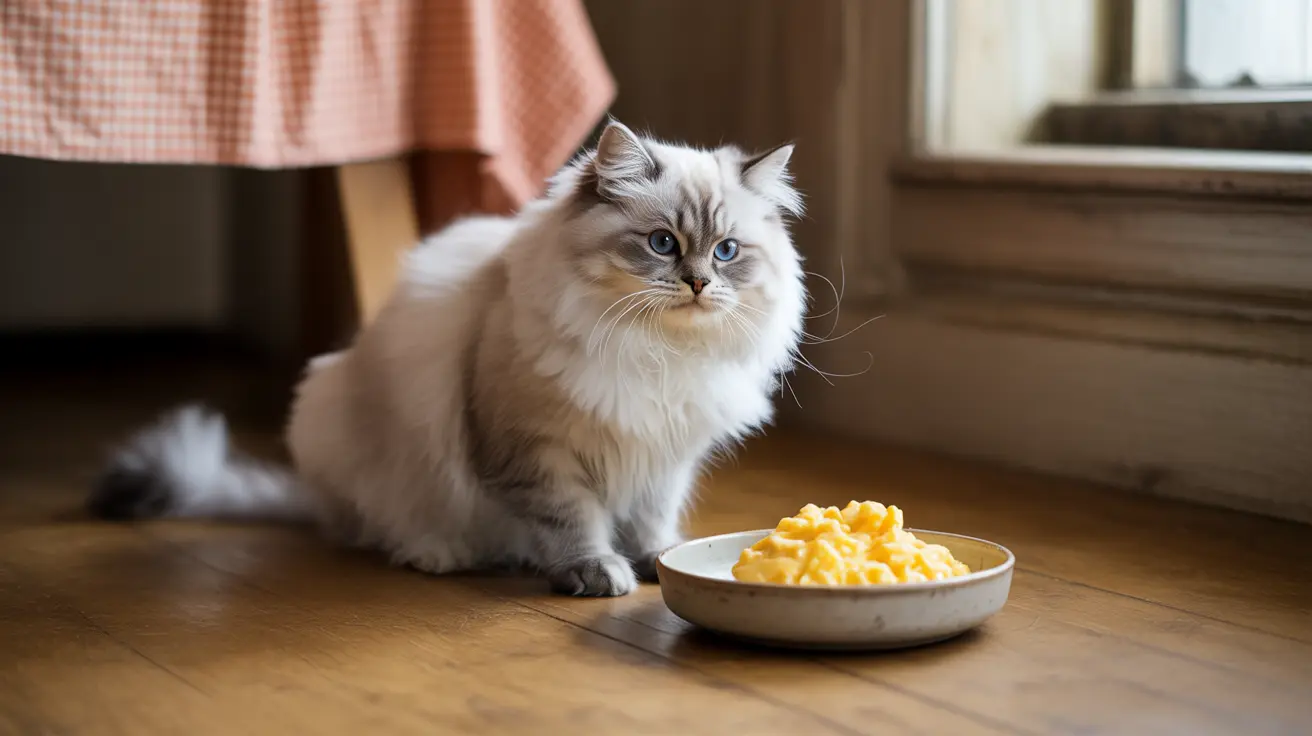The Nutritional Benefits of Scrambled Eggs for Cats
Scrambled eggs offer several important nutritional advantages for cats when served as an occasional treat:
High-quality protein is perhaps the most significant benefit, as eggs contain all essential amino acids cats need. Additionally, eggs provide important vitamins including A, D, E, and B-complex vitamins that support overall health.
The egg yolk specifically contains beneficial fatty acids and minerals like iron and zinc, which can contribute to your cat's skin and coat health.
Safe Preparation Guidelines
Cooking Methods
When preparing scrambled eggs for your cat:
- Cook eggs thoroughly to eliminate harmful bacteria
- Avoid using any oil, butter, or cooking spray
- Never add salt, pepper, or other seasonings
- Serve at room temperature
- Keep portions small (1-2 teaspoons maximum)
What to Avoid
Several common ingredients that humans enjoy with eggs can be harmful to cats:
- Onions and garlic (toxic to cats)
- Salt and other seasonings
- Butter or oil
- Milk or cream
- Raw or undercooked egg
How Often Can Cats Eat Scrambled Eggs?
While eggs are nutritious, they should only be offered as an occasional treat. A good rule of thumb is to limit egg treats to once or twice per week. Treats, including eggs, should make up no more than 10% of your cat's daily caloric intake.
Always introduce new foods gradually and watch for any signs of digestive upset or allergic reactions.
Potential Risks and Considerations
While properly prepared scrambled eggs are generally safe for cats, there are some important considerations:
- Allergic reactions are possible, though rare
- Overfeeding can lead to weight gain
- Raw eggs can cause biotin deficiency
- Cats with certain health conditions may need to avoid eggs
- Some cats may have difficulty digesting eggs
Special Cases and Exceptions
Kittens and Senior Cats
Extra caution is needed when feeding eggs to kittens or senior cats. Always consult with your veterinarian first, as these age groups may have special dietary needs or restrictions.
Cats with Health Conditions
If your cat has kidney disease, diabetes, or other health conditions, check with your vet before introducing eggs into their diet. Some conditions may require strict dietary control.
Frequently Asked Questions
Can cats eat scrambled eggs, and how should they be prepared safely?
Yes, cats can eat scrambled eggs when they're fully cooked and prepared without any additives. Cook the eggs thoroughly without oil, butter, or seasonings, and serve in small portions (1-2 teaspoons).
What are the nutritional benefits of feeding scrambled eggs to my cat?
Scrambled eggs provide high-quality protein, essential amino acids, vitamins (A, D, E, B-complex), and minerals like iron and zinc. These nutrients support muscle maintenance, immune health, and coat condition.
Is it safe to give my cat scrambled eggs regularly or only occasionally?
Scrambled eggs should only be given occasionally, ideally 1-2 times per week maximum. They should not replace regular cat food and should make up no more than 10% of your cat's daily caloric intake.
Can scrambled eggs cause allergic reactions or health problems in cats?
While rare, some cats may experience allergic reactions to eggs. Watch for signs like vomiting, diarrhea, or skin irritation. Overfeeding eggs can also lead to weight gain and nutritional imbalances.
Should I avoid adding salt, butter, or seasoning when giving scrambled eggs to my cat?
Yes, absolutely avoid all seasonings, salt, butter, and oils when preparing eggs for cats. These additives can be harmful to your cat's health and should never be included.






